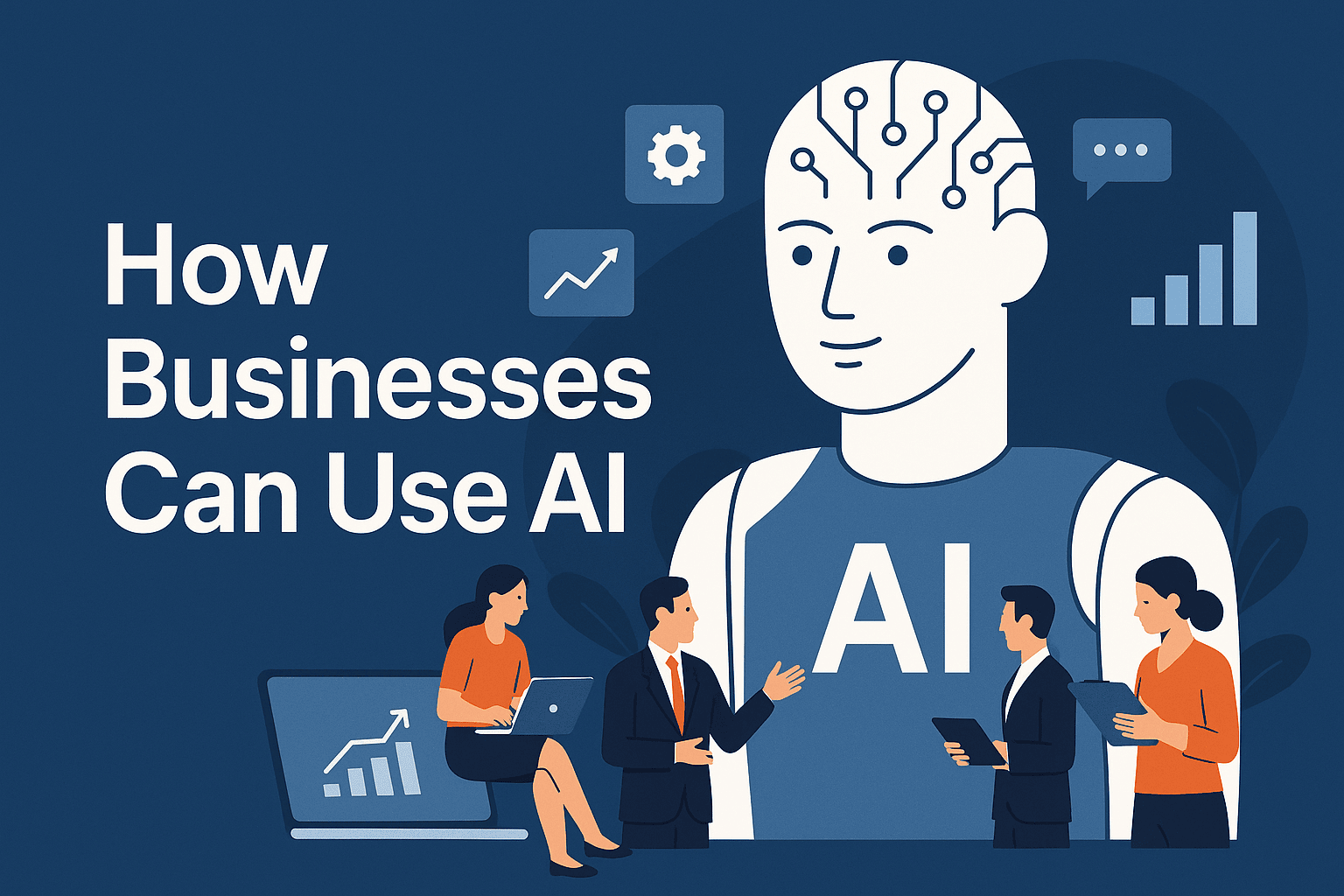How Businesses Can Use AI to Drive Growth and Efficiency
Artificial Intelligence (AI) is no longer just a futuristic concept—it’s a practical tool that forward-thinking businesses are already leveraging to improve operations, customer experiences, and bottom-line results. From automating repetitive tasks to unlocking new insights from data, AI is transforming the way companies operate across all industries.
In this comprehensive blog, we’ll explore how businesses of all sizes can use AI—with real-world applications, benefits, and actionable insights.
What Is Artificial Intelligence in Business?
Artificial Intelligence refers to machines or software systems that simulate human intelligence—such as learning, problem-solving, pattern recognition, and decision-making. In business, AI typically involves:
- Machine Learning (ML): Algorithms that learn from data to make predictions or decisions.
- Natural Language Processing (NLP): Enabling machines to understand and respond to human language.
- Computer Vision: AI that interprets visual information.
- Robotic Process Automation (RPA): Automating repetitive digital tasks.
Why Should Businesses Care About AI?
Here are some compelling reasons:
- Save Time and Money: Automate tasks, reduce manual errors, and lower operational costs.
- Make Better Decisions: Analyze large datasets to uncover trends and insights.
- Boost Productivity: Free up human teams to focus on high-value work.
- Enhance Customer Experiences: Deliver personalized, responsive service.
- Stay Competitive: Gain an edge over businesses that still rely on outdated methods.
10 Powerful Ways Businesses Are Using AI
1. Customer Service Automation
AI-powered chatbots and virtual assistants are transforming customer support.
Benefits:
- 24/7 support without increasing staff
- Faster response times
- Lower customer service costs
Example: Companies like Amazon and HDFC Bank use chatbots to answer FAQs, guide users, and handle complaints.
2. Predictive Analytics for Better Decision-Making
AI can analyze historical data to forecast future trends—like sales patterns, inventory needs, or customer behavior.
Benefits:
- Make data-driven decisions
- Reduce waste and improve supply chain management
Example: Retailers use AI to predict which products will be in demand during each season.
3. Marketing Personalization
AI helps tailor ads, content, and emails to each customer based on their behavior.
Benefits:
- Higher engagement and conversion rates
- Lower ad spend due to better targeting
Example: Netflix and Spotify recommend content using AI-based algorithms.
4. Sales Enablement and CRM
AI-powered tools like Salesforce Einstein and HubSpot use ML to prioritize leads and predict customer needs.
Benefits:
- Shorter sales cycles
- Higher deal closing rates
5. Fraud Detection and Risk Management
Banks, e-commerce, and fintech companies use AI to detect unusual patterns and prevent fraud in real time.
Benefits:
- Improve security
- Reduce financial losses
6. Inventory and Supply Chain Optimization
AI can help forecast demand, optimize delivery routes, and manage warehouse logistics.
Example: Amazon uses AI-driven robots and algorithms to speed up warehouse management.
7. Automated Hiring and HR Analytics
AI can scan resumes, schedule interviews, and even assess candidate fit.
Benefits:
- Save time for HR teams
- Reduce bias in hiring
8. Product and Service Innovation
AI can analyze market gaps and customer feedback to suggest new product ideas or improvements.
Example: Startups use AI tools to analyze app reviews and identify feature requests.
9. Financial Forecasting and Budgeting
AI helps automate budgeting by analyzing past expenses and predicting future cash flow needs.
Benefits:
- Reduce human error
- Make real-time financial decisions
10. AI-Powered Content Creation
Tools like ChatGPT can help businesses generate blogs, social media captions, emails, and product descriptions.
Benefits:
- Scale content production
- Maintain brand voice with less effort
How Small Businesses Can Start Using AI
Many small businesses assume AI is only for large corporations. That’s no longer true. Here’s how even startups and solopreneurs can get started:
Start with These Tools:
- Chatbots: Use tools like Tidio, Drift, or Intercom.
- Email Marketing: Try Mailchimp’s AI-powered subject line optimizer.
- CRM: Use HubSpot or Zoho with built-in AI features.
- Productivity: Use Grammarly, Notion AI, or Jasper AI.
Steps to Begin:
- Identify Repetitive Tasks: Start automating them.
- Use Freemium Tools: Many AI tools offer free versions.
- Train Your Team: Basic AI literacy can go a long way.
- Monitor and Measure: Set KPIs and track progress.
Future Trends: Where AI in Business Is Headed
- Hyper-personalization: Even more tailored customer experiences.
- Voice Commerce: Shopping via voice assistants like Alexa.
- AI Ethics and Regulations: Businesses will need to focus on transparency and fairness.
- Low-Code AI Tools: Anyone—not just developers—can implement AI workflows.
Final Thoughts
Artificial Intelligence is not a luxury—it’s a necessity for modern business success. Whether you’re a startup founder, a small business owner, or a corporate executive, AI offers tools that can help you grow faster, operate smarter, and serve customers better.
The future belongs to those who embrace AI—not as a threat, but as a partner.
Need Help Integrating AI into Your Business?
If you’re ready to explore how AI can work for your specific business model, reach out to us for a free consultation. Let’s build smarter solutions together.



